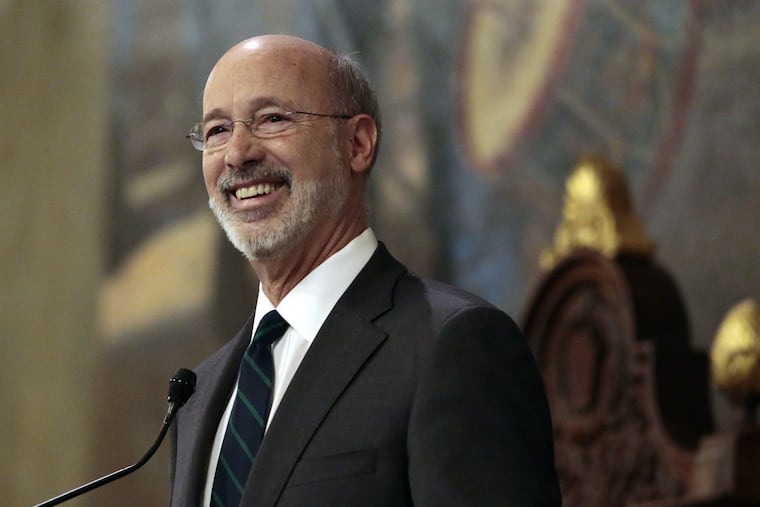Pa. Gov. Wolf signs executive order in attempt to bridge gender pay gap in state workforce
The governor said he hopes the executive order will help chip away at pay disparities.

HARRISBURG — Gov. Wolf stood behind a podium in his reception room Wednesday afternoon, pulled out a plastic bag with 79 cents in it and held it up for the crowd to see. That is roughly the amount, the governor and activists say, that women make on average for every dollar a man makes.
"This is unconscionable. It's wrong," he said.
A few moments later, the Democratic governor signed an executive order that will prohibit agencies that fall under his jurisdiction from asking some job applicants about their salary history during the hiring process. It's a move that he hopes will begin to chip away at the gender pay disparity.
The order, which takes effect in about three months, applies to employees who are in management roles or who are not subject to a collective bargaining agreement. There are about 2,000 open positions in those categories, according to the administration. The governor said some union contracts currently forces the administration to ask those questions in the hiring process, and he hopes to work with unions to eliminate those provisions in future agreements.
"We need to ensure that woman and families are not losing out on thousands of dollars a year and millions of dollars over their lifetime," the governor said.
The governor also encouraged legislators to pass bills that would seek to strengthen the state's equal pay law, which prohibits employers from discriminating based on gender. But some groups are leery about changing the current law.
Gene Barr, president of the Pennsylvania Chamber of Business and Industry, released a statement Wednesday cautioning against "fundamental changes" to the current state law.
"Anyone familiar with operating a business knows that pay differences among employees can and do exist for many reasons that have absolutely nothing to do with gender discrimination," Barr said. "Equal pay law must account for that reality or we risk subjecting honest employers to frivolous and costly lawsuits."
That argument wasn't new to state Rep. Brian Sims (D., Philadelphia), who is sponsoring one of the bills that Wolf supports. He said he rarely hears substantive arguments against equal pay bills.
"When I do, what I hear is that the market dictates what people should get paid, and if the market says you can pay a woman less than a man, [you] get away with it," Sims said.
The American Association of University Women says there is, on average, a 21-percent pay gap for women in Pennsylvania, and the disparities can be larger for African-American, Hispanic and Native American women.
Contact Lasherica Thornton at lthornto@go.olemiss.edu